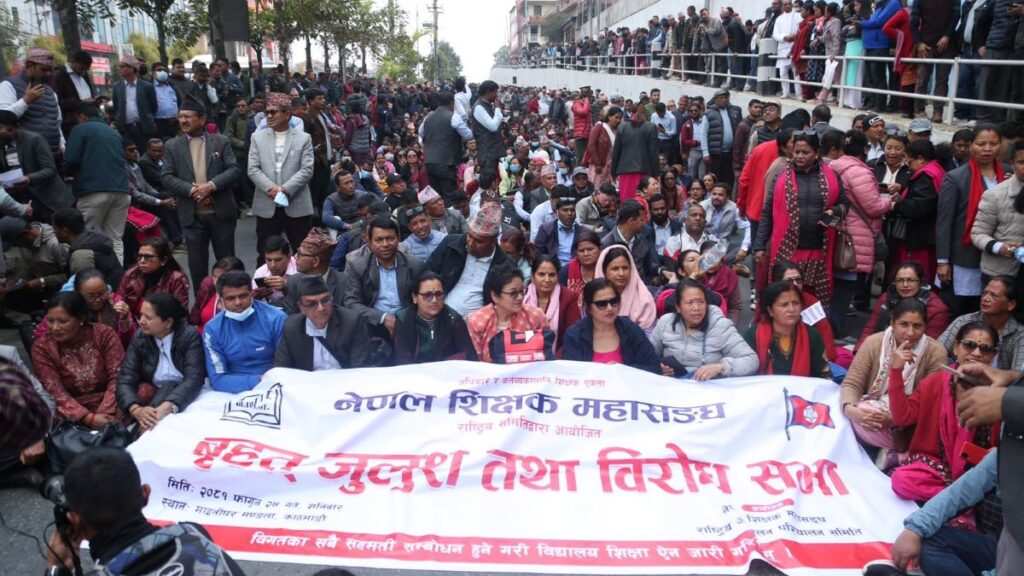Teachers from various parts of Nepal gathered in the streets of Kathmandu on Wednesday, urging the government to promptly enact the long-delayed School Education Bill.
The Nepal Teachers’ Federation (NTF) organized the demonstration to mark a new stage in the ongoing conflict between the government and educators over teacher control and educational reform.
Teachers from all around the nation gathered and marched through the city, starting in Maitighar and moving on to Baneshwar, the political center of Nepal. The demonstrators’ message was clear: they would not return to classrooms until their demands were met. They carried posters bearing phrases like “Enact the Education Act now,” “Respect the teaching profession,” and “Teachers are nation builders.”
School education bill pending

At the heart of the conflict is the School Education Bill, which has been sitting in Parliament for some months. Teachers argue that the government has demonstrated its disregard for the education sector by repeatedly promising to pass the law without taking action.
Experts consider the bill crucial for settling disputes over teacher hiring, pay scales, assessment procedures, and, more broadly, for outlining the responsibilities of the federal, provincial, and local governments in administering education.
The Kathmandu Post claims that teachers had previously taken to the streets. Teachers staged similar protests in March 2025, calling for the government to keep its end of the bargain.
An agreement struck in September 2023, when the government promised to alter and pass the Education Bill, is where the present protest got its start. The instructors feel even more betrayed, though, because they claim that the authorities have not kept their promises.
Is the government protecting the teacher’s rights?
The jurisdictional dispute over school instructors is one of the most divisive topics. The Nepalese Constitution gives local governments complete control over education. As a result, local authorities maintain that they should have direct authority over school teachers.
The teachers’ community, on the other hand, is adamantly against this, citing concerns about localized abuse of power, instability, and politicization. Many think that assigning teachers to local units could expose them to discrimination based on political allegiance, arbitrary transfers, and inconsistent rules between provinces.
“We are not against decentralization,” said a representative of the Nepal Teachers’ Federation during the rally, “but we demand safeguards that ensure our profession is respected and that teachers are not subjected to political games at the local level.”
The demonstration takes place at a time when the nation’s public education system is already facing several difficulties, such as a lack of teachers, uneven curricula, and inadequate facilities. These large-scale protests may disrupt the academic calendar as many schools approach exam season.
Education specialists and civil society organizations have called on the administration and the teachers who are protesting to reach a compromise. Instead of confrontation, many stress the need for a more cooperative approach to the creation and application of policies.
The following few days will be crucial as the protest moves into its next stage. At the expense of kids, teachers, and the future of Nepal’s educational system, will the government give in to the teachers’ demands and expedite the School Education Bill, or will the impasse continue?


 Angelina Jolie Calls Gaza a “Mass Grave” for Palestinians
Angelina Jolie Calls Gaza a “Mass Grave” for Palestinians  Star Wars Fans Light Up Japan
Star Wars Fans Light Up Japan  Anti-Trump Protests Erupt Across U.S. Cities
Anti-Trump Protests Erupt Across U.S. Cities  Teachers’ Demands Cannot Be Addressed in Budget Session
Teachers’ Demands Cannot Be Addressed in Budget Session  Gagan Thapa on Kulman, Says Ministers Should Focus on What Matters
Gagan Thapa on Kulman, Says Ministers Should Focus on What Matters  Forget Murder, I Haven’t Even Slapped Anyone: Prachanda
Forget Murder, I Haven’t Even Slapped Anyone: Prachanda